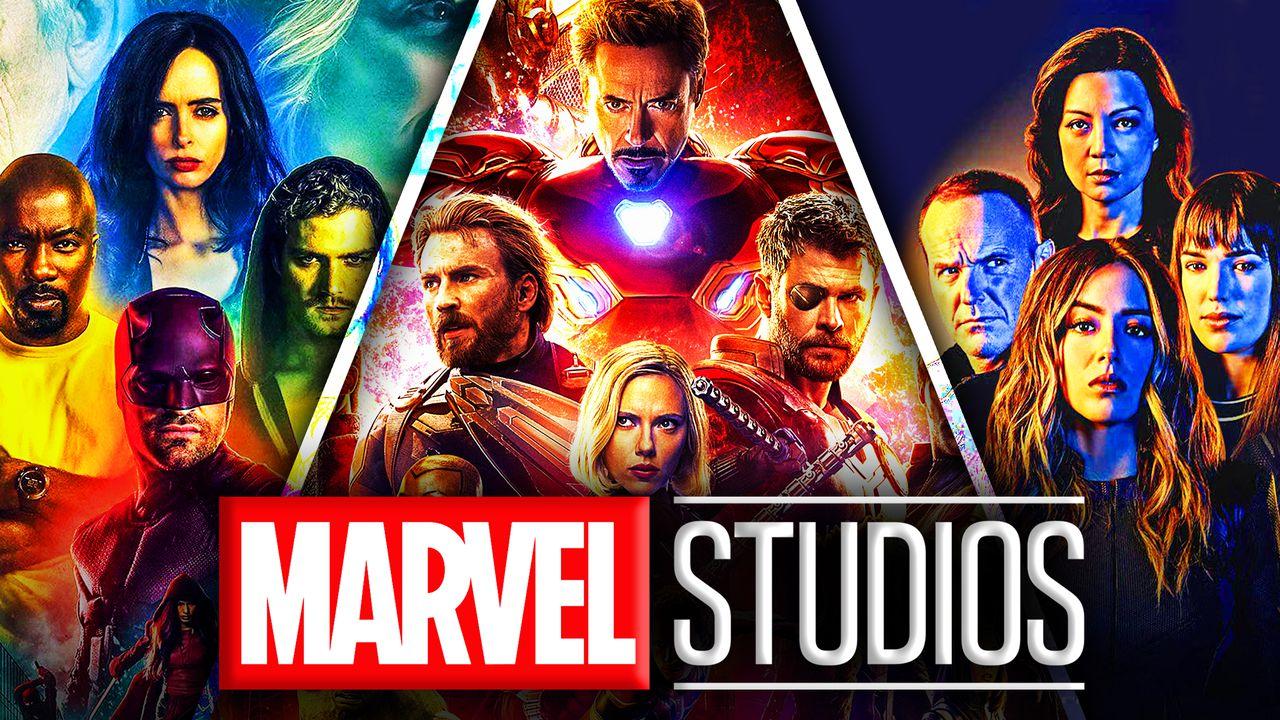
Whether the shows produced by Marvel Television are considered to be within the same continuity as the films has always been a hotly debated topic ever since Agents of SHIELD premiered on ABC as the first television show, supposedly, connected to the Marvel Cinematic Universe.
It only became hotter over time as the films continued not to acknowledge the shows in any tangible capacity. Then, things went supernova when Agents of SHIELD essentially became an alternate-continuity by its fifth season, which took place in another timeline entirely.
Due to news of a Disney+ show starring Nick Fury, Jamie Foxx returning as Electro, and rumors of Charlie Cox returning as Daredevil in Spider-Man: No Way Home, fans are reinvigorated by the notion that Marvel Studios could still embrace Marvel Television shows like Agents of SHIELD.
However, those fans should re-evaluate their expectations before they get out of hand and become disappointed when Kevin Feige doesn't end up rehiring Chloe Bennet as Agents of SHIELD's Daisy Johnson or continue the story of Netflix's Daredevil in the Spider-Man threequel.
Here's why it's unlikely why Marvel Television won't connect to the MCU, however, also why there may still be a bit of hope in that regard.
MARVEL STUDIOS IS NOT MARVEL TELEVISION

What should be made abundantly clear to those unfamiliar with the original corporate structure of Marvel Entertainment is that Marvel Studios and Marvel Television were always separate divisions of the company, while both being direct subsidiaries of Marvel Entertainment led by Issac “Ike” Perlmutter as CEO.
Marvel Studios was founded in 1993 with Kevin Feige only becoming President of the studio in March 2007. It wasn't until June 2010 that Marvel Television was founded with Jeph Loeb as Executive Vice President.
Before Marvel Television was up and running, Marvel Studios already released Iron Man, The Incredible Hulk, and Iron Man 2. This is not to mention that Marvel Studios had already signed a lease agreement with Raleigh Studios to film Iron Man 2, Thor, Captain America: The First Avenger, and The Avengers.
After multiple false starts, including a show starring The Hulk developed by Guillermo del Toro, it wouldn't be until Agents of SHIELD in 2013 that Marvel Television would produce its first live-action show. Despite Kevin Feige helping announce the series to screaming fans at New York Comic-Con alongside Joss Whedon in 2012, he would have absolutely nothing to do with Agents of SHIELD for its entire seven-year run.
Kevin Feige actually had no involvement with Marvel Television throughout its entire ten-year existence, with the sole exception being Agent Carter. Not only did Feige act as an executive producer, which he did not for any other show, but Christopher Markus & Stephen McFeely, the writers for the Captain America trilogy and the last two Avengers films, are credited as the creators of the show.
They even wrote the first episode, “Now Is Not the End,” with Joe Russo directing the second episode of the series, “Bridge and Tunnel.”
Simply put, Marvel Studios and Marvel Television never worked together in any capacity in their decade of existence alongside one another, except for Agent Carter. This degree of separation between the two studios was not helped by Kevin Feige's abysmal relationship with Ike Perlmutter.
BAD BLOOD
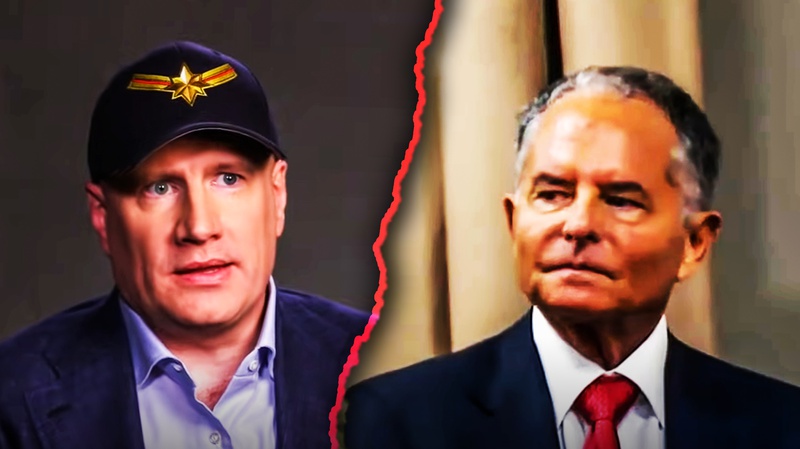
In 2007, a creative committee that existed within Marvel Studios comprised six individuals: Kevin Feige, Louis D'Esposito, Dan Buckley, Joe Quesada, Brian Michael Bendis, and Alan Fine. These producers and comic writers would give Marvel Studios input on every movie with Marvel Entertainment CEO Ike Perlmutter having the final say—sometimes for the worse.
Perlmutter and this creative committee were allegedly responsible for Ronan being such a poor villain in Guardians of the Galaxy, Maya Hansen being changed from the primary villain in Iron Man 3, driving away Edgar Wright from Ant-Man, and much more.
Ike Perlmutter had "different ideas" and even prevented films like Black Panther and Captain Marvel from moving forward for the longest time, which was said by former producer Craig Kyle during a panel at Long Beach Comic-Con 2016 to be the case:
“We had a lot of plans on the hopper… We had Black Panther, which we're doing now, other projects that I can't mention… We want to make those movies, but we answered to people who have different ideas. Even Kevin Feige answered to people who had different ideas at the time. But after ten years, we finally scraped them off our boots, and now you're seeing those movies, you're seeing Captain Marvel. Those fights have had rooms for a long time.”
What truly pushed Kevin Feige over the edge was Ike Perlmutter attempting to slash the budget for Captain America: Civil War and being unwilling to pay Robert Downey Jr. to return as Tony Stark. It supposedly got so bad that Perlmutter demanded the writers remove the character from the script entirely.
According to Bob Iger's book, The Ride of a Lifetime, this conflict was what caused him to restructure the company in 2015 and move Marvel Studios out of control of Ike Perlmutter:
“Kevin is one of the most talented film executives in the business, but my sense was that the strained relationship with New York was threatening his continued success. I knew I had to intervene, and so in May 2015, I made the decision to split Marvel’s movie-making unit off from the rest of Marvel and bring it under Alan Horn and the Walt Disney Studios. Kevin would now report directly to Alan, and would benefit from his experience, and the tensions that had built up between him and the New York office would be alleviated.”
The creative committee was no more, and Marvel Studios was now out of the clutches of Perlmutter, which still left Marvel Television tied to the frugal CEO.
Separating the movie studio from its original parent company would lead to one last desperate push for a property Perlmutter valued, one that he tried pushing for years to supersede the X-Men—Inhumans.
RISE AND FALL OF INHUMANS
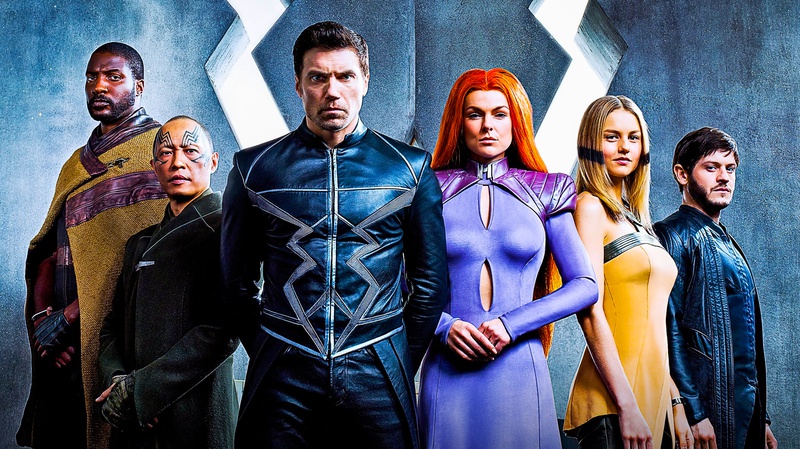
Before The Walt Disney Company acquired 21st Century Fox for $71.3 billion in cash-and-stock, mutants were out of the hands of Marvel Studios for decades.
In the 1990s, when the comic book industry set itself on fire, Marvel was in danger of going under completely. As a result, Marvel auctioned off the film rights to its most popular characters to multiple movie studios to stay afloat, including the X-Men and Fantastic Four.
Perlmutter became frustrated with Fox profiting off both properties, so while nothing is official and based on hearsay from comic writers and outlets, he apparently ordered Marvel Comics to cancel the Fantastic Four, stop making new mutant characters, and reduce their prominence entirely.
This meant that that the X-Men would be excluded from cartoons and video games for years, not just the comics, with Perlmutter finding his replacement with the Inhumans. Suddenly, Inhumans were given a massive push in the comics, creating new characters like Kamala Khan and Mosaic and even pinning them against mutants in later storylines.
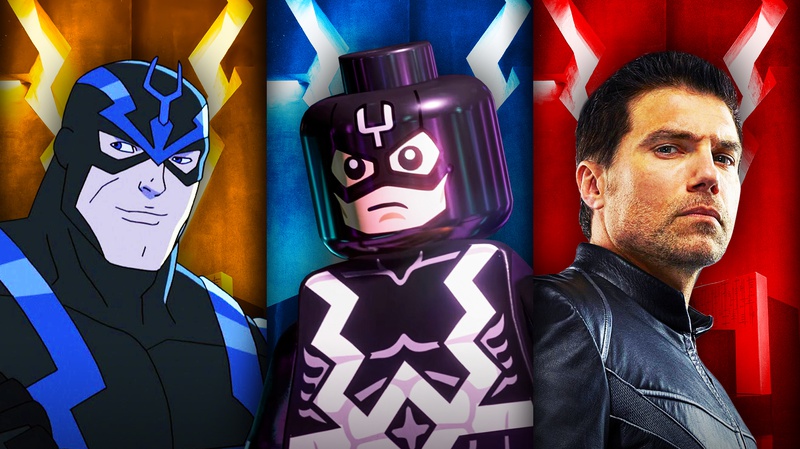
Extending to other media, the exclusion of the X-Men in games like Marvel's Avengers and Lego Marvel Super Heroes 2 didn't go unnoticed by fans, with Inhumans even taking center stage in both stories. The cartoons were greatly affected by this new mandate too, with entire episodes in shows like Ultimate Spider-Man, Avengers Assemble, Hulk and the Agents of SMASH, and more dedicated to the Inhuman Royal Family and their home of Attilan.
Marvel Television introduced Inhumans in live-action for the first time in the second season of Agents of SHIELD and remained a primary focus for the remainder of its run. Kevin Feige himself even announced an Inhumans movie in 2014 alongside the rest of the next slate of MCU films.
Keeping all of this in mind and how much Ike Perlmutter was pushing this IP, it was incredibly telling that one of the first things Kevin Feige did after finally being free of the former CEO was quietly remove Inhumans from the release schedule entirely and indefinitely shelf the project with the promise that an Inhumans movie "will happen for sure."
Ten days after that comment, Inhumans was announced to become an eight-episode series on ABC, an obvious and desperate push from Perlmutter. A year and a half after the show was announced and subsequently aired, Inhumans was, unsurprisingly, canceled after just one season.
A month before its cancellation, Kevin Feige officially announced Eternals as being in development at Marvel Studios, as if getting the last laugh.
ONE-WAY REFERENCES
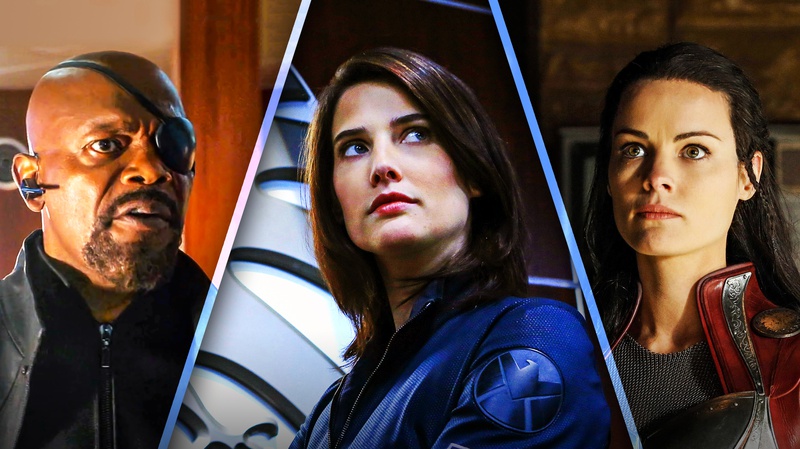
References, name-drops, direct tie-ins to the films, and supporting characters like Nick Fury, Maria Hill, and Sif making appearances on Agents of SHIELD have been common evidence from fans that the shows are, indeed, canonically linked to the wider universe. However, the same cannot be said for the films, which have never attempted to do anything similar, except once.
The only show that the films have ever directly and blatantly referenced was Agent Carter. James D'Arcy, who played Edwin Jarvis in the show opposite Hayley Atwell's Peggy Carter, made a quick cameo in Avengers: Endgame alongside John Slattery's Howard Stark.
When asked in an AMA on Reddit with Joe and Anthony Russo on the unofficial Marvel Studios subreddit about their decision to include James D'Arcy, the Russos said that “because Markus and Mcfeely were instrumental in engineering that show, and because I directed one of the episodes. It seemed appropriate.”
Thus, the only reason D'Arcy was included in Endgame was due to both the directors and writers having personal involvement with Agent Carter and a rapport with the actor.
The only other time the films could plausibly have referenced one of the shows, specifically Agents of SHIELD, was when Nick Fury alluded to the Theta Protocol plot-point from that show in Avengers: Age of Ultron:
“Nice, right? I pulled her out of mothballs with a couple of old friends. She's dusty, but she'll do.”
However, film scripts are written well ahead of shows, which Maurissa Tancharoen and Jed Whedon were graciously given access to and managed to write around, unlike Avengers: Endgame. Unfortunately, it was such a nightmare to incorporate into the show that they just decided to give up and completely ignore it.
This makes it entirely more likely that they built the Theta Protocol subplot around that innocuous line from Nick Fury rather than Joss Whedon purposefully teeing up this plot point for his brother's show.
Otherwise, the films have never made references using props or name-drops to characters or events from the shows when they easily could have with minimal effort. There have even been times when the films actually contradicted Marvel Television rather blatantly.
IGNORING CONTINUITY
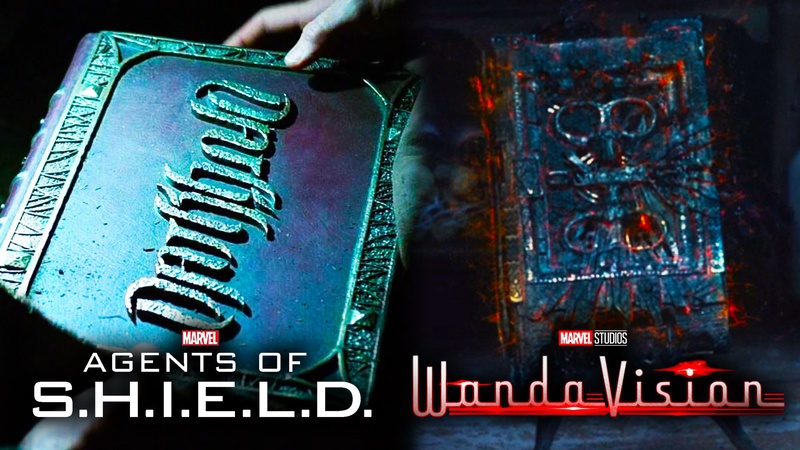
After a global Inhuman outbreak was established in Agents of SHIELD in 2016, writers Christopher Markus & Stephen McFeely were asked if this Inhuman outbreak would be mentioned or referenced in Captain America: Civil War. But, neither of them had a single clue what the interviewer was talking about, especially when fish oil was brought up:
Christopher Markus: “I have to confess, having come here, I've seen no TV since I got here in April. I haven't seen the vast majority of this season of ‘Agents of S.H.I.E.L.D.” There's fish oil?”
Stephen McFeely: “Is there really fish oil? What are you talking about?”
It was clear at that point Marvel Studios didn't pay much attention to what Marvel Television was doing on its shows, despite how often producers and Kevin Feige reassured fans that the films and shows would eventually crossover.
Recently, director James Gunn said that "There was never any coordination between the earlier TV stuff & the cinematic side of Marvel like there is now that they’re all under the purview of Marvel Studios" when Gunn claimed WandaVision was the first MCU show:
There have been multiple omissions and contradictions like this from Marvel Studios as recently as WandaVision itself.
In the episode “We Interrupt This Program,” acting Director of SWORD, Tyler Hayward, said to Monica Rambeau that her mother “...built this place from the ground up. You grew up here.” This implied that that SWORD has existed as an organization for at least a few decades.
However, in the fifth season premiere of Agents of SHIELD, it's revealed that Fury never told Phil Coulson, his “one good eye” and the man he left to restore SHIELD, anything about such an organization existing:
“Fury never said anything about deep-space outposts being developed, did he?”
“There was nothing like this in his black box.”
Another character asked Coulson directly whether an organization like SWORD exists, with Coulson denying it:
“So, wait, SHIELD doesn't have a space division called SPEAR or something?”
[Coulson shakes head]
“Really?”
Another potential continuity issue that some fans have been tussling with is the introduction (or reintroduction) of the Darkhold in the MCU sporting a drastically different look from its other appearances in Agents of SHIELD and Runaways.
It was made worse when WandaVision director Matt Shakman and head-writer Jac Schaeffer had contradicting answers regarding whether the Darkhold in WandaVision is the same one seen in both shows.
Even so, Shakman said that while he "would imagine it's the same book," he stipulated that "I don't know exactly how it was used in those other shows, because I wasn't a regular viewer, but the Darkhold has a comics origin."
It was no better when Schaeffer was even blunter in a separate interview and asked if the writers' room ever took into consideration the Darkhold's previous appearances. Schaeffer drove home that this Darkhold wasn't the same, saying, "We were not looking at that book. This was the Darkhold for this story."
So, while Marvel Studios likely hasn't gone out of its way to contradict Marvel Television over the years, it certainly didn't pay enough attention to not doing exactly that and showing a clear lack of coordination between the two studios.
HANDCUFFED TO OLD BAGGAGE
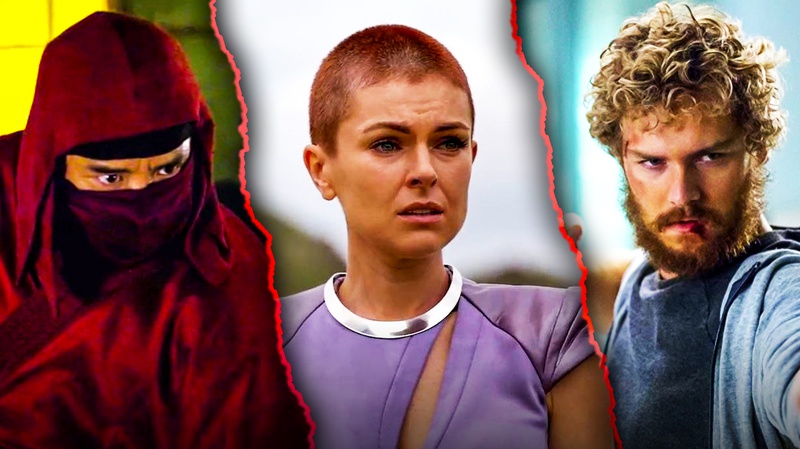
In one of Kevin Feige's many reassurances about the films and television shows crossing over, he said something telling about the potential risks that could come from including television characters in the films; that the television people could end up “handcuffed” depending on what Marvel Studios ends up doing with those characters:
“Or, if we were to do something in a film that absolutely handcuffs what the team can do in season 2 of whatever show, they don’t want to be handcuffed. They shouldn’t be handcuffed. It’s just finding the right time and right place to do it.”
The same can be said about Marvel Studios being "handcuffed" by Marvel Television regarding what it could and couldn't do with the characters and stories already adapted by the smaller studio. As previously explained, besides Agent Carter, Kevin Feige and the rest of Marvel Studios had absolutely no involvement whatsoever with any other show produced by Marvel Television for the last seven years.
To put it in perspective, in those seven years, excluding Agent Carter, Marvel Television produced ten shows supposedly connected to the Marvel Cinematic Universe, collectively containing 26 seasons and 358 episodes of content.
Excluding Inhumans, Runaways, and Cloak & Dagger, that would still be 20 seasons and 297 episodes from both Agents of SHIELD and the Marvel Netflix shows. Agents of SHIELD alone has seven seasons and 136 episodes with the Marvel Netflix shows (Daredevil, Jessica Jones, Luke Cage, Iron Fist, The Defenders, and The Punisher) combined having 13 seasons and 161 episodes.
It is odd to think that Kevin Feige would be willing to follow up and adhere to everything that Marvel Television had done when he had absolutely no involvement in producing any of it. If he did, Feige would himself be "handcuffed" by the choices that Marvel Television had made with the characters and stories.
As an example of how Feige could easily be handcuffed, it was recently reported that Jameela Jamil would be playing Titania in She-Hulk. In the comics, Titania has had a romantic relationship with another supervillain, Crusher Creel, since the 1980s that has continued in the comics to this day.
It would only be natural for this character to appear alongside Titania in the future. But, unfortunately, Feige won't be able to adapt him into She-Hulk or anywhere else in the MCU because Creel was killed off in Agents of SHIELD.
The same can be said for multiple characters such as Graviton, Glenn Talbot, Ben Urich, and many more who can't be brought back without contradicting those shows. Ben Urich's loss was excruciating since, not long after his death in the first season of Daredevil, Marvel Studios struck a deal with Sony to include Spider-Man in the MCU.
More concerning is the mediocre execution of various characters that Marvel Studios would have to be saddled with, such as Danny Rand, the Inhuman Royal Family, and The Hand. All three were received universally poorly by critics and fans at various stages, especially The Hand in Iron Fist and The Defenders.
If Marvel Studios were to continue the story of Netflix's Daredevil, it would be stuck with the boring, and mostly dead, interpretation of the ancient ninja clan. As Kevin Feige said when discussing handcuffing Marvel Television, one can hardly believe he would want the same done to himself.
MARVEL TELEVISION IS DEAD, LONG LIVE DISNEY+

Over two years ago, the then-current chairman-CEO of Disney, Bob Iger, announced Disney+ in a conference call and signaled the inevitable death of Marvel Television.
Just a month before this announcement, Netflix canceled Iron Fist, likely due to the reception of the series not improving with its second season but probably also because Netflix had caught wind of what Disney was planning.
Soon, one after the other, Netflix began axing every Marvel show on its service including Luke Cage, Jessica Jones, The Punisher and even one of its most praised and beloved original series: Daredevil.
A week after the last two Marvel shows on Netflix were canceled, Kevin Feige explained in an interview why the Disney+ shows would have a much greater connection to the films:
"Yes. Directly, yeah. One hundred percent. In large part it's because we've been working on Disney+ for quite a while now, at the exact same time that we were working on the post-Avengers: Endgame MCU, and therefore for the first time ever developed them together."
This arguably explains why Marvel Studios and Marvel Television never once had any meaningful crossover with any of their characters—they were never on equal footing and never worked together for the past seven years. However, now that everything is being done under one roof, the crossover between shows and films is a logistical possibility.
At that point, there was no longer a reason for Marvel Television to exist.
On October 15, 2019, Kevin Feige became Chief Creative Officer of Marvel Entertainment, meaning that all executives for comics and television would report directly to him, including Jeph Loeb of Marvel Television.
Marvel Television was officially shut down two months later with all its remaining series in production folding into Marvel Studios and any series in development being canceled, like Tigra & Dazzler.
Helstrom was canceled too, the last live-action Marvel Television production headed by Jeph Loeb. With its cancelation, Marvel Television was truly dead, and Disney+ became the future of Marvel Studios.
NAILS IN THE COFFIN
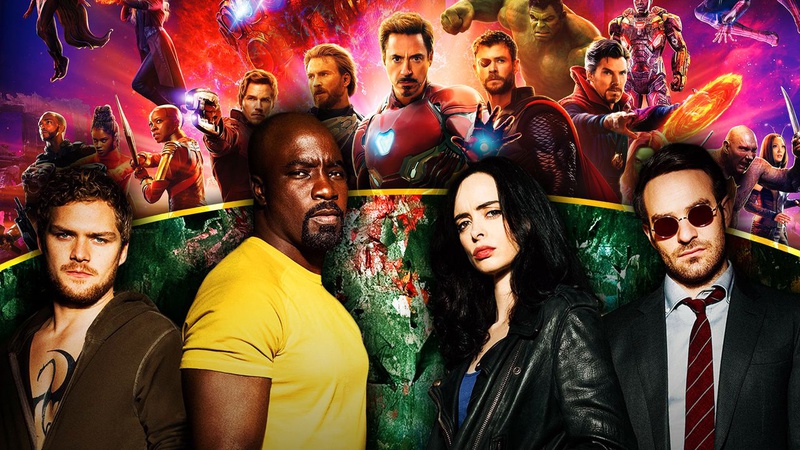
This newfound anticipation and hope that Marvel Studios will finally make use of what Marvel Television has established hinges on Secret Invasion and Ms. Marvel. With minimal effort, these two shows could easily acknowledge Agents of SHIELD as canon to the rest of the MCU. But, conversely, the opposite could just as easily happen.
While Secret Invasion could ignore using characters like Daisy Johnson, Melinda May, and so forth, it could still be a problem if the series ends up forming the Secret Warriors, as Nick Fury did in the comics.
Those unfamiliar with Agents of SHIELD should know that the Secret Warriors were already formed in that show, albeit briefly and only sticking around for an episode or two before the concept was completely abandoned.
If that team does form in Secret Invasion, it would be odd if Daisy Johnson or anyone else related to the team from Agents of SHIELD wasn't at least name-dropped. Otherwise, it'd be a strange coincidence for another secret covert team of super-powered individuals and agents to also call themselves Secret Warriors.

Additionally, and more pressing for the preservation of continuity with Agents of SHIELD, is that Ms. Marvel stars a character who is Inhuman. Thus, it will have to address how Kamala Khan actually goes through Terrigenesis, the process in which a human's Inhuman genes are activated. In Agents of SHIELD, a global outbreak occurred due to the oceans being tainted by Terrigen Crystals.
It is incredibly underwhelming in comparison to how the vast majority of the population on Earth ends up awakening their Inhuman genes in the comics; there, an Eldritch-like cloud of Terrigen Mist circled the globe, carried only by the winds, no telling which populated area it would hit next. People huddled in their homes and sealed their windows to avoid it, lest they potentially trigger their ancient dormant genes.
Not to say that Marvel Studios will do that exactly, but Kamala likely won't end up somehow swallowing an old tainted fish oil pill for breakfast, especially considering her faith would forbid her from even taking one anyway.

Another concern is whether that Inhuman outbreak from Agents of SHIELD will be acknowledged at all. The United States President addressed it on national television in the show, so it's not like people would forget it happened or not know what an Inhuman would be. If this outbreak isn't mentioned whatsoever in Ms. Marvel, it might as well not have happened at all.
In all likelihood, Marvel Studios will want to be the ones to debut Inhumans to the world on its terms, not Marvel Television, and give its own explanation for why so many of them have begun appearing around the world only now, including in New Jersey.
IT'S (LITERALLY) NOT WORTH IT
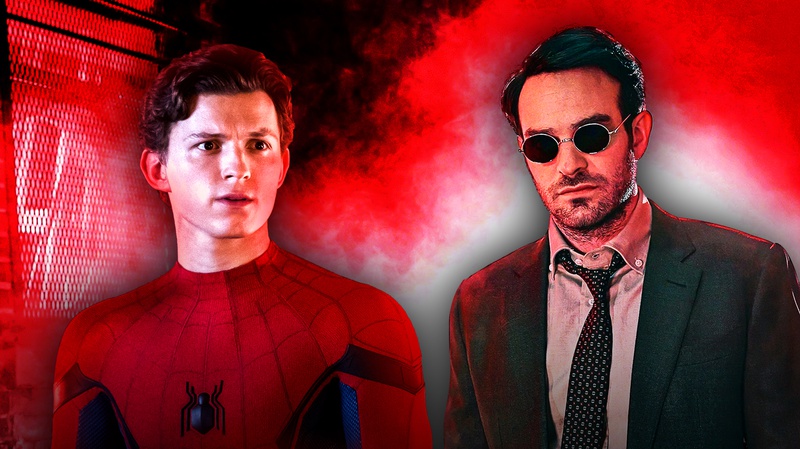
It should be made clear that, contrary to popular belief, Netflix doesn't actually own the exclusive distribution rights to Daredevil, Jessica Jones, Luke Cage, Iron Fist, The Defenders, and The Punisher like Universal does with The Incredible Hulk, which is why that particular movie is not on Disney's own streaming service, at least for now.
Bob Iger even stated this in 2013 when the deal with Netflix was struck:
“This gives us an opportunity to create and own four new series that Netflix will have exclusively [on] for a period of time, starting in 2016, when the series are made available to them.”
The Hollywood Reporter also reaffirmed that Netflix never had ownership over any of its Marvel content. Every live-action Marvel show was always owned by Disney with Netflix paying ABC Studios licensing fees to keep them on its streaming service.
Yes, all these shows could theoretically be removed like other “Netflix Original” series, but what about those licensing fees? They aren't just fees for each show but for each season of its respective shows, and they're apparently "steep" fees too.
Disney ending such a lucrative exchange is doubtful, especially when Netflix is currently paying fees for thirteen seasons of content. Subsequently, if Disney weren't to end this agreement with Netflix, it definitely wouldn't continue the incarnations of these characters in the MCU as it would essentially be free advertising for a rival streaming service.
If viewers wanted to know more about Charlie Cox's Daredevil in Spider-Man: No Way Home, they could only find the rest of his story on Netflix. So, an easy solution for Marvel Studios is to make it immediately obvious to audiences that this Murdock is a fresher take on the character unrelated to the Netflix series but still played by the original actor.
Setting that aside, even if Disney ended this agreement and continued these shows on its other streaming service, Hulu, another question would be if all the original actors would even be available or willing to return as these characters. Yes, Cox is reportedly returning to the role, but the jury is still out on the rest of the Defenders.
Plus, any hopes of Chloe Bennet returning as Agents of SHIELD's Daisy Johnson in Secret Invasion or Ms. Marvel are low, especially when she's already signed onto CW's Powerpuff Girls. However, that doesn't mean that fans of these shows aren't entirely without hope.
THE GOOD, THE BAD, AND THE MAYBE
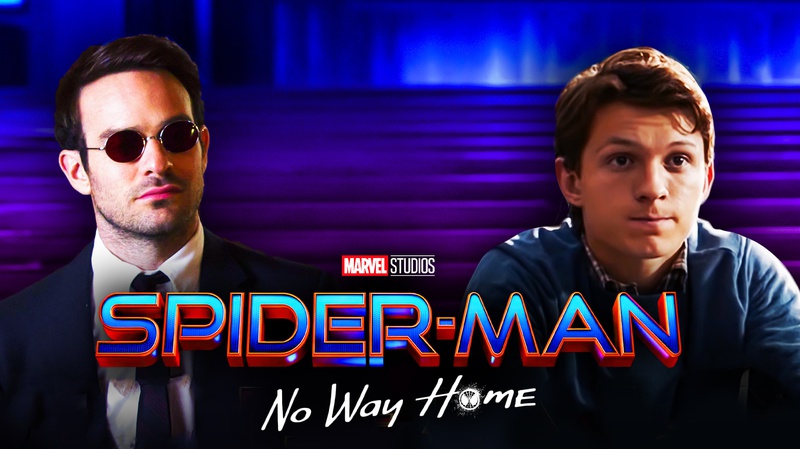
While all of this must feel like a huge buzzkill for fans of Agents of SHIELD and the Marvel Netflix shows, there's recent evidence that at least points to the actors returning to their previous roles, just not how fans will remember them.
Jamie Foxx returning as Electro shows that Kevin Feige is not only willing to have actors play multiple roles in the MCU but the same characters that have already been adapted by other studios and producers. It has been rumored for quite some time that Kevin Feige liked Charles Cox's portrayal of Matt Murdock in Netflix's Daredevil, which is encouraging, as Feige felt the same way about Jamie Foxx as Electro in The Amazing Spider-Man 2.
Taking into account the most recent rumor of Charlie Cox returning as Daredevil in the upcoming threequel, Kevin Feige playing coy when directly asked about this rumor, and Charlie Cox apparently being spotted on the set, it's almost assured that Cox will return as The Man Without Fear in the MCU.
Unfortunately for those fans, based upon everything discussed thus far, all signs point to Charlie Cox's Daredevil in Spider-Man: No Way Home being a clean slate of the character and not a continuation of his Netflix counterpart. The same happened with J. K. Simmons' J. Jonah Jameson returning as a brand-new iteration of the character in the post-credit scene of Spider-Man: Far From Home.
Jamie Foxx even accidentally let slip that his Electro “won’t be blue in this one,” implying that he wouldn't be the same Electro he portrayed in The Amazing Spider-Man 2. However, Alfred Molina was apparently told by director Jon Watts that his Doctor Octopus' story would pick up right from "that moment" at the river in Spider-Man 2.
While his death could be hand-waved as not technically being witnessed by the audience, it'd be harder to explain away Willem Dafoe's Norman Osborn returning, who fans saw skewered by his own glider. It was even accompanied by a funeral, so Dafoe's Green Goblin being the same character is a bit more unlikely.
The most fans of these shows can expect is the original actors returning to rebooted roles, thereby discontinuing the narrative previously established in their individual shows. Another possibility is that they could exist in their own universe in the multiverse, which wouldn't be a surprise with Tobey Maguire and Andrew Garfield reportedly returning as Spider-Man.
The point of this entire diatribe isn't to insist that Kevin Feige won't follow what Marvel Television has already established but to lower expectations that he will. It's reasonable that some fans should anticipate potential disappointment if Feige doesn't end up continuing the stories of these characters from the shows that they love.
On the other hand, if this entire article ends up being proven false, fans who've reeled in their expectations will end up even happier, and the writer of this article will happily eat some humble crow pie.












